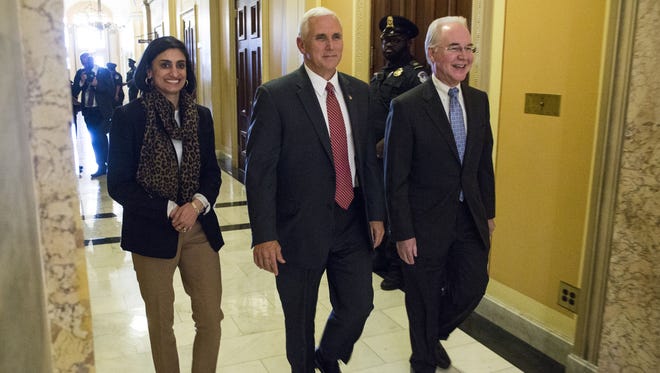Experts: Pre-existing coverage in House GOP bill would fall far short
The $23 billion included in the House Republican plan to repeal the Affordable Care Act (ACA) to pay for people with pre-existing chronic health conditions will only cover about 5% of the estimated 2.2 million people who need insurance, a new analysis concluded.

The funding wouldn't come close to covering the people with individual insurance plans in Texas or Florida, said health care consulting firm Avalere. On Thursday, the House passed legislation that would repeal and replace the Affordable Care Act, narrowly approving the bill that would unravel many of the law’s popular consumer protections.
Many of these people, whose health issues could be as simple as acne or as serious as late-stage cancer, were either banned from buying insurance before the ACA took effect or found that whatever insurance they could buy was too expensive.
The new version of the Republican plan, called the American Health Care Act, revives an old plan called "high-risk pools," pots of money set aside for people whose health conditions make buying insurance very expensive. Before the current law, when these patients could get insurance, they faced high deductibles and very high out-of-pocket costs, says Adams Dudley, a physician and director of the Center for Healthcare Value at the University of California, San Francisco.

Peg Timpone, 60, survived Stage 2 breast cancer a decade ago, and is now terrified by what she’s seeing in Congress.
The Fort Myers, Fla., real estate agent has an ACA policy, but makes too much to qualify for any subsidy. Monthly premiums are $1,500, more than her mortgage.
“I’m scared to death about what’s happening,” she said. “They’re going to price me out of the market. It may get to the point where I have to decide about keeping my house or having health insurance.”
The new bill allows states to apply for a waiver that allows them to permit insurers selling policies in their state to charge people more money if they let their insurance lapse and if the state creates a program to help "high risk" — read: really sick — patients buy insurance and the health plans that cover them. Because such insurers would charge these people much more money for insurance, the patients could use the money from the "high risk" pools to buy insurance.
Read more:
What does the Republican Obamacare repeal bill actually do?
Obamacare repeal: Republicans scramble in 11th hour with new health plan
House to vote Thursday on GOP Obamacare repeal bill
Even with the additional $8 billion added Wednesday, the proposed program would only allow a few small states to opt into coverage for people with pre-existing conditions, said Avalere senior vice president Caroline Pearson. If a large state received a waiver, "many chronically ill individuals could be left without access to insurance," she said.

The Commonwealth Fund has estimated these pools would need about $178 billion a year in funding to cover all of the people with pre-existing conditions.
If states were to also allocate all the other funds in the $100 billion "Patient and State Stability Fund" in the AHCA, a maximum of 600,000 of the 2.2 million people with pre-existing conditions would be covered, Avalere concluded.
On Thursday, Health and Human Services Secretary Tom Price called suggestions that the AHCA would weaken "protections" for people with pre-existing conditions "nonsense." He noted that any state that wanted a waiver would have to prove they were providing "better coverage for older and sicker patients."
"The plan is clear: nobody will be denied coverage for being sick," Price said in an editorial on CNBC.com Thursday. "Insurers would finally be able to bring down costs for all patients, including those with preexisting conditions."
Contributing: Frank Gluck in Fort Myers and Deirdre Shesgreen in Washington
What's your healthcare experience? Tell us at healthinsurance@usatoday.com